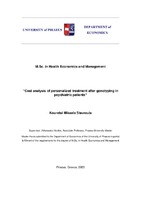Ανάλυση κόστους της εξατομικευμένης θεραπείας μετά από γενετικό τεστ σε ψυχιατρικούς ασθενείς
Cost analysis of personalized treatment after genotyping in psychiatric patients

Προβολή/
Λέξεις κλειδιά
Pharmacogenetics ; Genetic test ; Major depressive disorder ; Cost of illness ; Illness burden ; Health care expenditures ; Personalized medicine ; Pharmacoeconomics ; Cost savings ; Health care reduction ; Cytochrome P450 ; PsychotropicΠερίληψη
Υπόβαθρο: Η οικονομική ανάλυση στη φαρμακογονιδιωματική είναι ένας αναδυόμενος κλάδος για την ανάλυση κόστους-αποτελεσματικότητας σε θεραπεία βασισμένη στο γονιδίωμα των ασθενών. Η παρούσα μελέτη αποτελεί μία μονοκεντρική μελέτη που βασίζεται σε δεδομένα πραγματικών ασθενών με Μείζονα Καταθλιπτική Διαταραχή, οι οποίοι είτε υποβάλλονται στο γενετικό τεστ και λαμβάνουν ανάλογη θεραπεία είτε λαμβάνουν συμβατική θεραπεία, χωρίς τη διεξαγωγή του γενετικού τεστ.
Μέθοδος: Tο Εργαστήριο Φαρμακογονιδιωματικής και Εξατομικευμένης Θεραπείας του Πανεπιστημίου Πατρών σε συνεργασία με την Ψυχιατρική Κλινική του Πανεπιστημιακού Νοσοκομείου Πατρών συμπεριέλαβε σε μία πολυκεντρική μελέτη ενήλικες ασθενείς (>18 ετών), διαγνωσμένους με Μείζονα Καταθλιπτική Διαταραχή. Σκοπός της παρούσας μελέτης ήταν η ανάλυση ενός δείγματος της μελέτης που διεξάγεται στην Πάτρα, με τον υπολογισμό του κόστους της συμβατικής και της εξατομικευμένης θεραπείας, τη σύγκριση των εναλλακτικών θεραπειών και την αξιολόγηση του κόστους της ασθένειας και των ανεπιθύμητων ενεργειών που εμφανίστηκαν σε κάθε προσέγγιση.
Αποτελέσματα: Συνολικά 62 ασθενείς συμπεριλήφθηκαν στην παρούσα μελέτη. Η μέση ηλικία των ασθενών στην ομάδα παρέμβασης ήταν 47,96 χρόνια, ο μέσος ΔΜΣ ήταν 26,2 Kg/m2, 13 ήταν άνδρες και 15 γυναίκες. Στην ομάδα ελέγχου, η μέση ηλικία των ασθενών ήταν 53 έτη, ο μέσος ΔΜΣ ήταν 26,76 Kg/m2, 8 ασθενείς ήταν άνδρες και 26 ήταν γυναίκες. Η λιανική τιμή του γενετικού τεστ υπολογίστηκε στα €198,46, οι φαρμακευτικές δαπάνες ανά μήνα ήταν €17,66 ανά ασθενή για την ομάδα παρέμβασης και €17,47 για την ομάδα ελέγχου, και άλλα άμεσα μη φαρμακευτικά κόστη περιλάμβαναν το κόστος παρακολούθησης από το θεράποντα ιατρό και το κόστος νοσηλείας, τα οποία ανήλθαν σε €16,35 και €9,80 μηναία για την ομάδα παρέμβασης και την ομάδα ελέγχου, αντίστοιχα. Δεν καταγράφηκαν αξιοσημείωτες διαφορές κόστους, εκτός από τους άνδρες στην ομάδα ελέγχου, των οποίων το κόστος σε φάρμακα ήταν 108,04% μεγαλύτερο σε σύγκριση με τους άνδρες στην ομάδα παρέμβασης. Αντίθετα, το αντίστοιχο κόστος για τις γυναίκες στην ομάδα παρέμβασης ήταν 49,96% μεγαλύτερο σε σύγκριση με τις γυναίκες στην ομάδα ελέγχου. Το 44,92% του συνολικού κόστους για φαρμακευτική αγωγή καταναλώθηκε για βασική θεραπεία στην ομάδα παρέμβασης έναντι 52,47% στην ομάδα ελέγχου, ενώ τα αντιψυχωσικά αντιπροσώπευαν το υψηλότερο κόστος μεταξύ όλων των θεραπειών για συνοδά νοσήματα. Κανένας από τους ασθενείς και στις δύο ομάδες δεν παρουσίασε μέτριες ή σοβαρές ανεπιθύμητες ενέργειες, καθιστώντας έτσι αδύνατη την αξιολόγηση της αποτελεσματικότητας.
Συμπεράσματα: Η παρούσα μελέτη, αν και δεν κατέστη δυνατό να υπολογιστεί η αποτελεσματικότητα της γενετικά καθοδηγούμενης φαρμακευτικής συνταγογράφησης, λόγω του μικρού αριθμού των περιστατικών που μελετήθηκαν, εν τούτοις αποτελεί την πρώτη προσπάθεια υπολογισμού του κόστους της γενετικά καθοδηγούμενης φαρμακευτικής αγωγής σε ψυχιατρικούς ασθενείς στην Ελλάδα σε σύγκριση με την συμβατική θεραπεία που δίνεται στους ασθενείς με ψυχικά νοσήματα. Η σύγκριση των δύο σκελών μελέτης έδειξε παρόμοιο θεραπευτικό κόστος. Προσδιορίστηκαν όλα τα κόστη και τα αντίστοιχα ποσοστά συμμετοχής τους στο συνολικό κόστος και αναλύθηκαν με βάση διάφορες ομάδες, όπως η ηλικία των ασθενών και τα φάρμακα που συνταγογραφούνται.
Μελέτη μεγαλύτερου αριθμού περιστατικών αναμένεται να επιβεβαιώσει ότι, όπως και στην καρδιολογία και την ογκολογία, η γενετικά καθοδηγούμενη φαρμακευτική αγωγή συμβάλλει στη μείωση των ανεπιθύμητων ενεργειών της φαρμακευτικής αγωγής και του συνοδού κόστους της θεραπείας σε ψυχιατρικούς ασθενείς.

